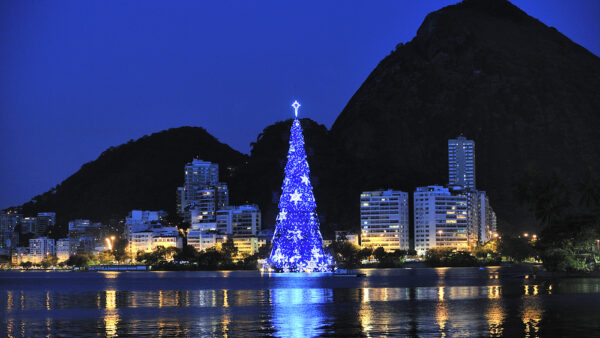Brazil is home to one of the world’s biggest Catholic populations, as well as a rapidly growing evangelical Protestant community. It is no wonder then, that Easter Sunday — celebrated this year on March 31 — holds such significance in Latin America’s largest country.
As with most religious celebrations in Brazil, the way the country commemorates Easter is the culmination of influences from around the world, particularly from Portuguese colonizers and immigrant populations from other Christian countries in Europe.
According to Western Christianity, Easter falls on the Sunday after the first full moon to follow the March equinox, which in Brazil signals the end of summer. But the date itself is the end of a long process that begins with Carnival — the country’s largest celebration and which ushers in the beginning of Lent, the 40 days of fasting and repentance that ends on Easter week.
In this chocolate jungle
Indeed, while fasting for Lent has certainly gone out of style in Brazil, one of the things some observant Brazilians give up during those 40 days is chocolate — a task made exceedingly difficult by the extent and extravagance of Easter marketing in Brazilian supermarkets.
Once New Year celebrations are out of the way, supermarkets quickly turn their attention to Easter and, in particular, chocolate eggs. Entire aisles of stores are dedicated to eggs of all shapes, sizes, brands, and prices. And instead of merely being stacked on shelves, these Easter gifts are typically hung above consumers’ heads, turning supermarkets into something between Charlie and the Chocolate Factory and Alien. Quite the trial for fasting chocoholics.
That said, the popularity of these eggs has diminished somewhat over time, and Brazilian supermarket aisles dedicated to Easter treats are becoming smaller and smaller as the years pass. The market for gourmet Easter eggs has grown significantly, while at the other end of the spectrum, some families prefer to buy bars of chocolate for Easter, noting that they provide a lot more bang for their buck than the often overpriced eggs.
On Easter Sunday, friends and family often engage in the tradition of exchanging chocolate (in egg-form or otherwise) as gifts.
Bring on the bacalhau
One religious tradition still adhered to by many, however, is the avoidance of eating red meat on the Good Friday holiday, the day that commemorates the crucifixion and death of Jesus Christ. While some more observant Catholics may abstain from eating meat throughout the entirety of Holy Week — or on every Friday throughout the year — the practice is still only widespread on Good Friday.
The idea behind the brief fast is to respect the sacrifices of Jesus, by giving up eating what the Church considers among the most “pleasurable” foods. Instead of going vegetarian for 24 hours, however, the tradition in Brazil is to replace the meat with salt cod, a remnant of the country’s Portuguese colonial history.
While salt cod is eaten year-round in Portugal — where it is known as bacalhau — it sees a major peak in consumption in Brazil on Easter, particularly on Good Friday. Families and restaurants prepare the dried fish in all kinds of typical Portuguese preparations, almost always accompanied by potatoes, boiled eggs, olives, and copious amounts of olive oil.
The thought process behind Brazil’s Easter bacalhau tradition, however, is somewhat harder to grasp at first. Brazil’s rivers and coastlines are teeming with fish, and there are plenty of high-quality local species that are readily available and, during the right season, affordable.
Bacalhau, on the other hand, is a dried and salted product made from a fish (cod) that can only be caught in the northern Atlantic Ocean. As such, it is particularly expensive to buy in Brazil, and difficult to find year-round.
The tradition, however, is rooted in the early 19th century, when the Portuguese brought their royal family to Rio de Janeiro. Not only did they already have a preference for bacalhau, but the preserved nature of salt cod made it the ideal option in a world before the refrigerator.
On Easter Sunday itself, all bets are off, however. Large family lunches are often organized, without any religious dietary restrictions. Feijoada or barbecues are often the most popular choices of meal.
The Easter processions
Easter processions and reenactments are common across Brazil, though more popular in small, countryside cities. As is the case with much of the country’s Catholic traditions, observances are often brought or based on those from Portugal or Spain, as is the case of the Procissão do Fogaréu, first introduced to Brazil by a Spanish priest in the 18th century.
Not dissimilar to Easter processions in Spain, participants line the streets of small Brazilian towns, bearing torches and wearing traditional Catholic dress — which often includes questionable-looking pointed white hoods — and reenact the imprisonment of Jesus Christ. The dates and format of the procession changes from town to town.










 Search
Search






































